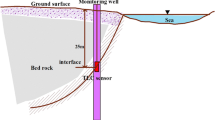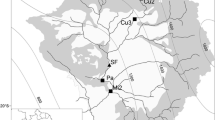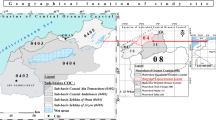Abstract
Global water resources are currently under increasing pressures that lead to their quantitative and qualitative degradation. Humanly imposed modifications of the environment lead to the deterioration of the quality and availability of the water resources, especially of vulnerable coastal, karstic systems. Towards the better understanding of the karst operational mechanisms, time series analysis is often employed, especially in lack of other resources. Under this scope, daily and hourly time-series of physicochemical characteristics (temperature, dissolved oxygen and electrical conductivity) for the period 2011–2015 at an especially vulnerable coastal wetland (Koumoundourou Lake, Athens, Greece) were statistically processed and analysed, so as to investigate the response of the lagoon to the underwater recharging karst system and the driving biological processes. Based on the results, the physicochemical variables are largely controlled by the groundwater inflows or sea water intrusion and macrophytes affect dissolved oxygen fluctuations. Precipitation affects the system after 72–79 days, while meteorological variables affect significantly the water temperature and electrical conductivity of the lagoon. Biological processes and freshwater inflows rather than climate factors seems to affect dissolved oxygen concentrations.





Similar content being viewed by others
Explore related subjects
Discover the latest articles and news from researchers in related subjects, suggested using machine learning.References
Amraoui F, Razack M, Bouchaou L (2003) Turbidity dynamics in karstic systems. Example of Ribaa and Bittit springs in the middle atlas (Morocco). Hydrol Sci J 48:971–984. https://doi.org/10.1623/hysj.48.6.971.51418
Antonopoulos VZ, Gianniou SK (2003) Simulation of water temperature and dissolved oxygen distribution in Lake Vegoritis, Greece. Ecol Model 160:39–53. https://doi.org/10.1016/S0304-3800(02)00286-7
Bartram J, Ballance R (1996) Water quality monitoring: a practical guide to the design and implementation of freshwater quality studies and monitoring programs, 2nd edn. World Health Organization & United Nations Environment Programme, London
Benavente J, Pulido-Bosch A (1985) Application of correlation and spectral procedures to the study of discharge in a karstic system (eastern Spain). Proc Ankara-Antalya Symp karst water Resour. IAHS 161:67–75
Boyd CE (2015) Water quality: an introduction, 2nd edn. Springer, Switzerland https://doi.org/10.1007/978-3-319-17446-4
Brown C (1998) Applied multivariate statistics in geohydrology and related sciences. Springer, Berlin. https://doi.org/10.1007/978-3-642-80328-4
Cyronak T, Santos IR, Erler DV, Maher DT, Eyre BD (2014) Drivers of pCO2 variability in two contrasting coral reef lagoons: the influence of submarine groundwater discharge. Glob Biogeochem Cycles Res 28:398–414. https://doi.org/10.1002/2013GB004598
Dimitriou E, Karaouzas I, Sarantakos K, Zacharias I, Bogdanos K, Diapoulis A (2008) Groundwater risk assessment at a heavily industrialised catchment and the associated impacts on a peri-urban wetland. J Environ Manag 88:526–538. https://doi.org/10.1016/j.jenvman.2007.03.019
Dimitriou E, Mentzafou A, Zogaris S, Koutsikos N., Colombari E., Markogianni V., Karaouzas I., Konstantinopoulou A., Stathopoulou E., Dasenakis M., Katsiapi S., Moustaka M. (2012) Monitoring of the ecological quality of Koumoundourou Lake and designing of management, restoration and developmental actions. Final Technical Report [in Greek]. Hellenic Centre for Marine Research - Institute of Marine Biological Resources and Inland Waters, Anavyssos
Fölster J, Johnson RK, Futter MN, Wilander A (2014) The Swedish monitoring of surface waters: 50 years of adaptive monitoring. Ambio 43:3–18. https://doi.org/10.1007/s13280-014-0558-z
Ford D, Williams P (2007) Karst hydrogeology and geomorphology. John Wiley & Sons ltd, the atrium, southern gate, Chichester, West Sussex PO19 8SQ, England https://doi.org/10.1002/9781118684986
Fox C (1909) On the coefficient of absorption of nitrogen and oxygen in distilled water and sea water, and of atmospheric carbonic acid in sea water. Trans Faraday Soc 5:68–87. https://doi.org/10.1039/TF9090500068
Frodge JD, Thomas GL, Pauley GB (1990) Effects of canopy formation by floating and submergent aquatic macrophytes on the water quality of two shallow Pacific northwest lakes. Aquat Bot 38:231–248. https://doi.org/10.1016/0304-3770(90)90008-9
George MG (1961) Diurnal variations in two shallow ponds in Delhi, India. Hydrobiologia 18:265–273. https://doi.org/10.1007/BF00162227
Geyer T, Birk S, Liedl R, Sauter M (2008) Quantification of temporal distribution of recharge in karst systems from spring hydrographs. J Hydrol 348:452–463. https://doi.org/10.1016/j.jhydrol.2007.10.015
Hyndman RJ, Athanasopoulos G (2018) Forecasting: Principles and Practice. OTexts. https://otexts.org/fpp2/. Accessed 20 October 2018
Johnson GW, Ehrlich R, Full W, Ramos S (2007) Principal components analysis and receptor models in environmental forensics. In: Murphy B, Morrison R (eds) Introduction to environmental forensics, 2nd edn. Academic Press, pp 207–272
Koutsomitros S, Mimides T, Sgoumpopoulou A, Rizos S (2001) Investigation of the self-cleaning ability of Lake Koumoundourou near Athens from oil pollution. Environ Eng Policy 2:155–159. https://doi.org/10.1007/s100220000029
Lambrakis N, Andreou AS, Polydoropoulos P, Georgopoulos E, Bountis T (2000) Nonlinear analysis and forecasting of a brackish karstic spring. Water Resour Res 36:875–884. https://doi.org/10.1029/1999WR900353
Larocque M, Mangin A, Razack M, Banton O (1998) Contribution of correlation and spectral analyses to the regional study of a large karst aquifer (Charente, France). J Hydrol 205:217–231. https://doi.org/10.1016/S0022-1694(97)00155-8
Liefer JD, MacIntyre HL, Su N, Burnett WC (2014) Seasonal alternation between groundwater discharge and benthic coupling as nutrient sources in a shallow coastal lagoon. Estuar Coasts 37:925–940. https://doi.org/10.1007/s12237-013-9739-4
Mangin A (1984) Pour une meilleure connaissance des systèmes hydrologiques. A’partir des analyses correlatoires et spectrales. J Hydrol 67:25–43
Margoni S, Psilovikos A (2010) Sustainable management of Agiasma Lagoon-River Nestos delta using R.E.MO.S. Daily monitoring data of water quality and quantity parameters. Trends, assessments, and natural hazards for the years 2000-2002. Desalination 250:287–296. https://doi.org/10.1016/j.desal.2009.09.045
Markogianni V, Dimitriou E, Karaouzas I (2014) Water quality monitoring and assessment of an urban Mediterranean lake facilitated by remote sensing applications. Environ Monit Assess 186:5009–5026. https://doi.org/10.1007/s10661-014-3755-0
Mayaud C, Wagner T, Benischke R, Birk S (2014) Single event time series analysis in a binary karst catchment evaluated using a groundwater model (Lurbach system, Austria). J Hydrol 511:628–639. https://doi.org/10.1016/j.jhydrol.2014.02.024
Menció A, Casamitjana X, Mas-Pla J, Coll N, Compte J, Martinoy M, Pascual J, Quintana XD (2017) Groundwater dependence of coastal lagoons: the case of La Pletera salt marshes (NE Catalonia). J Hydrol 552:793–806. https://doi.org/10.1016/j.jhydrol.2017.07.034
Mentzafou A, Dimitriou E, Zogaris S (2016) Integrated ecological assessment and restoration planning in a heavily modified peri-urban Mediterranean lagoon. Environ Earth Sci 75:983. https://doi.org/10.1007/s12665-016-5800-5
Mentzafou A, Papadogıannı C, Dimitriou E (2017) Time variations of the physicochemical parameters in a Mediterranean Lake. 15th Int. Conf. Environ. Sci. Technol. Rhodes, Greece, 31 August to 2 Sept. 2017
Olsen RL, Chappell RW, Loftis JC (2012) Water quality sample collection, data treatment and results presentation for principal components analysis - literature review and Illinois River watershed case study. Water Res 46:3110–3122. https://doi.org/10.1016/j.watres.2012.03.028
Padilla A, Pulido-Bosch A (1995) Study of hydrographs of karstic aquifers by means of correlation and cross-spectral analysis. J Hydrol 168:73–89. https://doi.org/10.1016/0022-1694(94)02648-U
Panagopoulos G, Lambrakis N (2006) The contribution of time series analysis to the study of the hydrodynamic characteristics of the karst systems: application on two typical karst aquifers of Greece (Trifilia, Almyros Crete). J Hydrol 329:368–376. https://doi.org/10.1016/j.jhydrol.2006.02.023
Papadopoulos V, Renieris P, Morfis A, Stasinos V (2004) Physical characteristics and water circulation [in Greek]. In: Study of the groundwater, the water of the Koumoundouros Lake and Elefsis gulf, in relation to the landfill area of the Western part of Attica region [in Greek]. Hellenic Centre for Marine Research, Athens, pp 42–61
Papathanasiou C, Makropoulos C, Baltas E, Mimikou M (2013) The hydrological Observatory of Athens : a state-of-the-art network for the assessment of the hydrometeorological regime of Attica. 13th Int Conf Environ Sci Technol (CEST 2013), 5–7
Paraschoudis V (2002) Hydrogeological study of West Attica (Megara - Thriassion plain), 1st volume: hydrogeological study [in Greek]. Ministry of Rural Development and Food, Athens
Psilovikos A, Margoni S, Psilovikos A (2006) Simulation and trend analysis of the water quality monitoring daily data in Nestos River Delta. Contribution to the sustainable management and results for the years 2000-2002. Environ Monit Assess 116:543–562. https://doi.org/10.1007/s10661-006-7671-9
Raeisi E, Karami G (1997) Hydrochemographs of Berghan karst spring as indicators of aquifer characteristics. J Cave Karst Stud 59:112–118
Roussakis G (2004) Bathymetry of Koumoundourou Lake [in Greek]. In: Study of the groundwater, the water of the Koumoundouros Lake and Elefsis Gulf, in relation to the landfill area of the Western part of Attica Region [in Greek]. Hellenic Centre for Marine Research, Athens, Greece, pp 17–22
Ruiz-Luna A, Berlanga-Robles CA (2003) Land use, land cover changes and coastal lagoon surface reduction associated with urban growth in Northwest Mexico. Landsc Ecol 18:159–171. https://doi.org/10.1023/A:1024461215456
Wallace J, Champagne P, Hall G (2016) Time series relationships between chlorophyll-a, dissolved oxygen, and pH in three facultative wastewater stabilization ponds. Environ Sci Water Res Technol 2:1032–1040. https://doi.org/10.1039/c6ew00202a
Wetzel RG (1992) Clean water: a fading resource. Hydrobiologia 243–244:21–30. https://doi.org/10.1007/BF00007017
Whitney RJ (1942) Diurnal fluctuations of oxygen and pH in two small ponds and a stream. J Exp Biol 19:92–99
Wolanski E, Elliott M (2016) Estuarine ecological structure and functioning. In: Estuarine Ecohydrology, 2nd edn. Elsevier, Amsterdam, pp 157–193
World Meteorological Organization (2013) Planning of water quality monitoring systems. Technical report series no. World Meteorological Organization, Geneva, p 3
Wu Q, Xia X, Li X, Mou X (2014) Impacts of meteorological variations on urban lake water quality: a sensitivity analysis for 12 urban lakes with different trophic states. Aquat Sci 76:339–351. https://doi.org/10.1007/s00027-014-0339-6
Acknowledgments
An initial shorter version of the paper has been presented in the 15th International Conference on Environmental Science and Technology (CEST2017), Rhodes, Greece, 31 August to 2 September 2017.
Author information
Authors and Affiliations
Corresponding author
Additional information
Publisher’s Note
Springer Nature remains neutral with regard to jurisdictional claims in published maps and institutional affiliations.
Rights and permissions
About this article
Cite this article
Mentzafou, A., Dimitriou, E. Time Series Analysis of the Physicochemical Parameters and Meteorological Factors in a Mediterranean Lagoon. Environ. Process. 6, 119–134 (2019). https://doi.org/10.1007/s40710-019-00346-1
Received:
Accepted:
Published:
Issue Date:
DOI: https://doi.org/10.1007/s40710-019-00346-1




